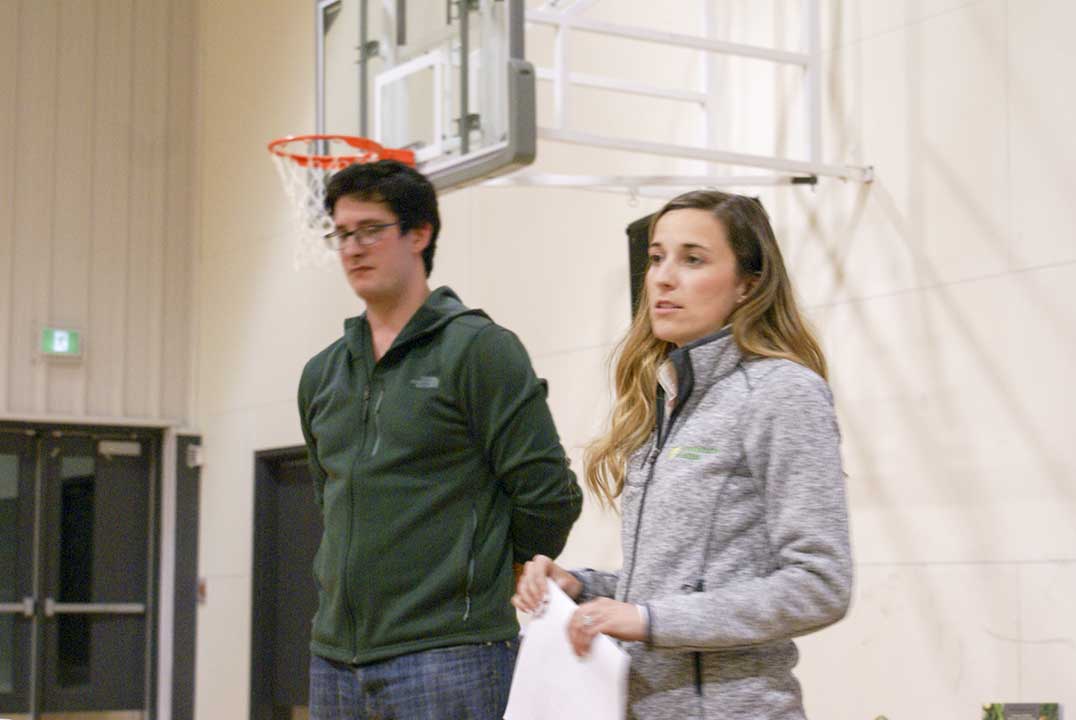AUNDECK OMNI KANING––Supporters of Manitoulin’s local food movement, both existing and newbies, gathered at the Four Directions Complex in Aundeck Omni Kaning on March 7 for the second of four Cultivating Food Sovereignty community forums. The forums are intended to provide a space for knowledge-sharing and collaboration.
“These community forums are a part of the Manitoulin Community Fresh Food Initiative, a project that originated from round table discussions beginning in 2015 hosted by a group called the Child Poverty Task Force,” said Kristin Bickell, project manager, Manitoulin Community Fresh Food Initiative. “The task force is a partnership of the district’s seven First Nation communities and four municipalities with Noojmowin Teg as the supporting organization.”
“The objective of the Fresh Food Initiative is to drive Manitoulin’s local food movement forward by supporting a wholistic approach to sourcing local produced food in sustainable and community-driven methods,” continued Ms. Bickell. “By connecting people with their food, the project aims to increase access to fresh and traditional foods, improve community food security and food literacy, and assist in providing opportunities for people to choose where their food comes from.”

Knowledge keeper Christianna Jones provided the opening prayer, speaking to the end of the winter season as Mother Earth is waking up. Ms. Jones is an advocate of local food and has been involved with the Wiikwemkoong Greenhouse for Change project. “The whole miracle of growth amazes me,” she said, explaining that spending time outdoors and in community gardens helps people find balance, to be calm and peaceful. “It builds community,” she continued. “People get out there, they’re sharing. They’re doing physical activities, and eating fresher, healthier food. Anybody who has weeded a garden knows.”
Shane O’Donnell of Heartwood Mushrooms spoke about incorporating edible mushrooms into your garden as a means of improving soil health and crop yield. Anyone who wasn’t interested in mushrooms prior to Mr. O’Donnell’s presentation certainly went home with a new perspective. An engaging speaker with a singular enthusiasm for fungi, he explained how growing mushrooms contribute to healthy soil in your garden.
“Healthy soil equals a healthy garden. You need sunlight and water,” he said. “You can’t control those. The soil itself, that’s something you can do. A lot of fungi have a symbiotic relationship with plants. The mycelium burrow into the plants’ roots. They reach down through the soil and bring up nutrients.”

community food forum.
photos by Lori Thompson
Ninety percent of plants form a special relationship with fungi, he explained. Mushrooms reproduce through spores, so by adding spores to wood chips or woody organic materials you can create a mushroom bed that is simple to maintain.
The mushrooms will break down whatever they’re fed and will actively build soil. Once the beds are established they will keep growing year after year. They tend to thrive in cool shady areas and work well when paired with a “three sisters” garden. For a minimal investment of $10-15 for a block of spores, mushroom growers will have large edible mushrooms in a very short timeframe.
Cassandra Gosselin and Jonathan Lavigne of Greenhouses Canada shared their innovative growing secrets for breaking through the barriers of conventional community gardening. Greenhouses Canada began with a small research and development greenhouse in Espanola in 2014. They have since expanded to a school in Lively and operate multiple divisions which include planning and operation, design/build or retrofit greenhouses, and grow produce for local restaurants, retailers and schools.
The Greenhouses Canada presentation provided comparisons between aeroponics, Dutch bucket and nutrient film technique (NFT) systems. Aeroponics is similar to hydroponics operations but instead utilizes vertical panels and misting towers. They are soilless with nutrients administered directly to plant roots. Aeroponics has low labour and water usage costs. It is an efficient closed system with the only water loss being water and nutrient uptake by plants.
Each panel in an aeroponics system contains 320 different plants. Three thousand plants can be harvested every 35 days, year round, within a 40 square foot room of aeroponics panels. The system does require technical know-how and detailed planning.
A Dutch bucket is a smaller system where a single plant is grown within a pod. A unique medium acts like soil, controls temperature and acts as a plant support. There is not a lot of plants per volume in this system. In a 100 square foot area there may be 25 plants, but they will grow very large.
An NFT system is also a closed single loop. Essentially it is an eavestrough containing plants. NFT is good at producing extremely high yields and is good when growing to sell produce by weight. Roots can clog the trough in this system and it can be tedious to manage.
They briefly discussed aquaponics before speaking to the marketing and selling side of commercial growing. Greenhouses Canada began as a research facility and donated produce to a soup kitchen until they were known and began to sell produce for profit. There are many regulations and rules for selling food, they noted, suggesting potential growers contact the Ontario Ministry of Agriculture, Food and Rural Affairs for information. There are certifications and standards to consider, as well as packaging, labeling and traceability.
Building your brand is the next step, they told attendees, and suggested offering free samples, participating in farmers’ markets and providing farm tours as examples. “People like to see, smell and taste the product before purchasing,” said Ms. Gosselin.
“We’re open to help you,” continued Ms. Gosselin. “To empower each other and help grow a strong local food hub.”
The next forums will be held at the Assiginack arena on Tuesday, March 20 and at M’Chigeeng First Nation Community Complex on Thursday, March 22. Doors open at 6:30 pm. Pre-registration is not required. For more information on the forums contact Kristin Bickell at 705-368-0229 ext 270.
Contact Heartwood Mushrooms at 519-217-9219 or Greenhouses Canada at 705-618-0762.



